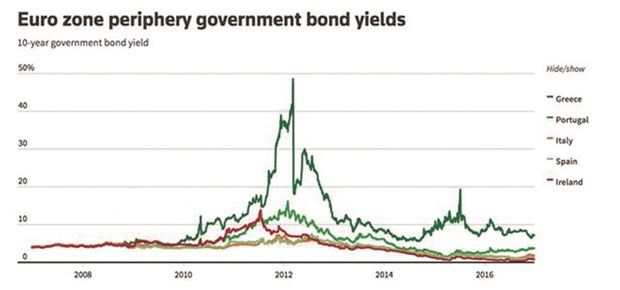Eurozone government bond yields fell yesterday, pulling back from multi-month highs, after the US Federal Reserve maintained a mildly upbeat economic view and gave no hints on when it will next hike interest rates.
Bond yields in the currency bloc have risen sharply this week on the back of strong economic data and signs that inflation is picking up, while rising political risks in France have created an additional headwind.
Data yesterday showed producer prices in the euro area rose a higher-than-expected 1.6% year-on-year in December.
But for now investors turned their attention away from data to the Fed.
The central bank on Wednesday gave no firm signal on the timing of its next rate move, pushing down both US Treasury yields and the dollar.
“The Fed meeting has provided a bit of a floor for eurozone bond markets,” said Mizuho rates strategist Antoine Bouvet. “I wouldn’t say the selling pressure has abated though.”
Germany’s benchmark 10-year Bund yield fell 2.5 basis points to 0.45%, holding below a one-year high hit last week just shy of 0.50%.
Two-year German bond yields fell to a two-week low at minus 0.73%.
Most other 10-year eurozone bond yields were 3-4 bps lower on the day, nudging away from multi-month highs hit this week.
French 10-year bond yields, held near Wednesday’s almost 17-month high of around 1.13%, keeping the gap over German peers close to its widest level in three years.
Rising political uncertainty ahead of the French presidential votes in April and May have unnerved investors and left French bonds moving out of step with their higher-rated peers.
France’s 10-year bond yield has risen 40 bps since the start of this year, while German and Dutch equivalents are up about 25 bps each.
Far-right presidential candidate Marine Le Pen is polling strongly ahead of the elections, while conservative Francois Fillon, erstwhile frontrunner to win the vote, has been tarnished by a scandal over fake pay.
A poll yesterday showed a majority of French voters want him to drop out of the election campaign.
France and Spain held auctions on Thursday, with yields at the Spanish debt sale rising sharply on the back of strengthening data and a rebound in inflation.
“The fast-money trade at the moment appears to be to sell non-Bunds,” said Patrick Jacq, European rate strategist at BNP Paribas. “That suggests (bond-yield) spreads could widen to potentially very wide levels.”
Also in focus for markets is the Bank of England meeting later in the day.
The central bank is expected to publish its inflation report.

.
